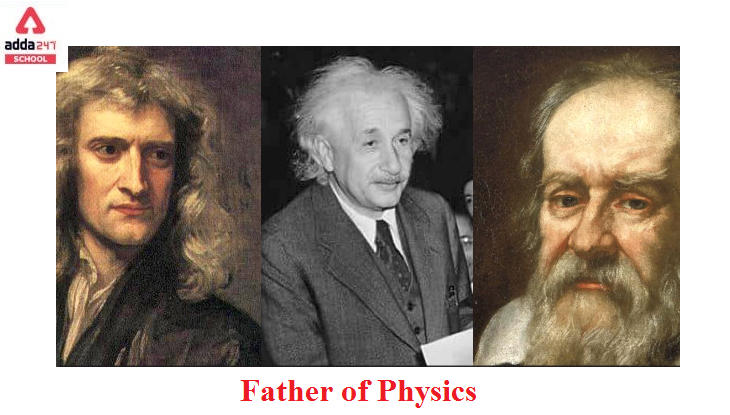Father of Physics
Galileo Galilei is considered the father of Physics.
In this article, we will be getting to know who he exactly was, where he was from and a lot more about Galileo Galilei, the genius.
Read About: Father of Biology
Father of Modern Physics- Galileo Galilei
The full name of Galileo Galilei is Galileo di Vincenzo Bonaiuti de’ Galilei. Galileo Galilei was an astronomer, physicist, and engineer who lived in the 16th century. Polymath is a term used to describe Galileo Galilei. Galileo Galilei was born in Pisa, which is now in modern-day Italy. Galileo is often referred to as the “Father of Modern Physics.” He is also known as the “Father of Modern Science,” the “Father of the Scientific Method,” and the “Father of Observational Astronomy.”
Speed and velocity, gravity and free fall, the idea of relativity, inertia, and projectile motion were among Galileo’s research topics. In addition, he engaged in the field of applied science and technology. He was the inventor of the thermoscope and a number of military compasses.
The Father of Modern Physics Galileo even utilized the telescope to observe celestial objects for scientific purposes. Telescopic confirmation of Venus’ phases, observation of Jupiter’s four greatest satellites, observation of Saturn’s rings, and analysis of sunspots are among Galileo Galilei’s contributions to observational astronomy.
Who is the Father of Physics in India?
Galileo’s support for Copernican heliocentrism drew criticism from both inside the Catholic Church and among astronomers. Later, in Dialogue Concerning the Two Chief World Systems, Galileo defended his beliefs.
He spent the rest of his life under house imprisonment, during which time he wrote Two New Sciences, a collection of essays on kinematics and material strength. He summarised studies on the two sciences that he had done some forty years before. Furthermore, now known as kinematics and material strength, it was published in Holland to avoid censorship. Galileo is generally referred to as the “Father of Modern Physics” as a result of his work. In 1638, he lost his sight totally and was suffering from a terrible hernia and insomnia. He was given permission to fly to Florence for medical consultation.
Pope Urban VIII had become distracted with court intrigue and began to dread persecution or threats to his own life before Galileo’s trial for heresy. After being accused of cowardice in protecting the church, Urban responded angrily and fearfully against Galileo.
Until 1642, Galileo was open to guests. He died on January 8, 1642, after suffering from fever and heart palpitations. He died at the age of 77. Ferdinando II, Grand Duke of Tuscany, desired that he be buried in the main body of the Basilica of Santa Croce and that a marble mausoleum be built in his honour. It was close to his father’s and other ancestors’ graves.
Galileo’s right hand’s middle finger. After Pope Urban VIII and his nephew, Cardinal Francesco Barberini, complained, the plans were scrapped. Because Galileo had been condemned by the Catholic Church for “vehement suspicion of heresy,” Pope Urban VIII and his nephew, Cardinal Francesco Barberini, objected. Instead, he was entombed in a modest room adjacent to the novices’ chapel. In 1737, he was reburied in the basilica’s main body after a memorial was erected in his honour. In addition, three fingers and a tooth were taken from his body throughout this process. The Museo Galileo in Florence, Italy, is now displaying these fingers.
Galileo Galilei held a library of at least 598 books on the outskirts of Florence in his final years. He was not allowed to write or publicise his opinions while under house arrest.
Galileo may have feared that his collection of books and manuscripts would be taken by the government and burned because no mention of such materials was made in his last will and testament, based on his previous experience. After Galileo’s death, when the majority of his belongings, including his library, passed to his son, Vincenzo Galilei, Jr., an itemised inventory was created. Sestilia Bocchineri, his wife, received the collection after his death in 1649.
Read About: First India Pilot
Who is the Father of Physics?
The title Father of Physics goes to three people. Issac Newton Albert Einstein and Galileo Galilei are referred to as the Fathers of Physics. Physics is a subfield of science that focuses on studying natural phenomena common in the natural world.
The construction of this scientific discipline, formally known as physics, was drawn primarily from the fields of astronomy, optics, and mechanics. These were methodologically united and connected with the help of geometry. These mathematical disciplines began in antiquity with the Babylonians. Moreover, with Hellenistic writers such as Archimedes and Ptolemy, it grew with time.
Read About: Sugar Bowl in the world
Who is the Father of Science
“father of science” is not attributed to a single individual, as the development of science is a collective and ongoing human endeavor that spans centuries and involves the contributions of many individuals from various cultures and time periods.
However, if you are asking about influential figures in the history of science, there are several notable individuals who made significant contributions to the development of scientific thought and methodology. Some of these include:
Thales of Miletus: An ancient Greek philosopher often considered one of the first philosophers and scientists. He is known for his inquiries into the natural world and his attempts to explain natural phenomena without resorting to myth or supernatural explanations.
Aristotle: Another ancient Greek philosopher and scientist who made important contributions to many fields of science, including biology, physics, and ethics. His works laid the foundation for many areas of Western science.
Galileo Galilei: An Italian physicist, astronomer, and mathematician who played a crucial role in the Scientific Revolution of the 17th century. He made groundbreaking observations with the telescope and advocated for the heliocentric model of the solar system.
Sir Isaac Newton: An English mathematician and physicist who is often regarded as one of the most influential scientists in history. His laws of motion and universal gravitation revolutionized our understanding of the physical world.
Albert Einstein: A theoretical physicist whose theories of relativity, particularly the theory of general relativity, transformed our understanding of space, time, and gravity. He also made important contributions to the development of quantum mechanics.
These individuals are just a few examples of the many scientists and thinkers who have contributed to the advancement of science over the centuries. Science is a collaborative and evolving enterprise, and it is built upon the work of countless individuals and their collective efforts to understand and explain the natural world.









 NIOS 10th Result 2025 Out @results.nios....
NIOS 10th Result 2025 Out @results.nios....
 Mahatma Gandhi Central University CUET C...
Mahatma Gandhi Central University CUET C...
 CUET BBAU Cutoff 2025, Check Category Wi...
CUET BBAU Cutoff 2025, Check Category Wi...









